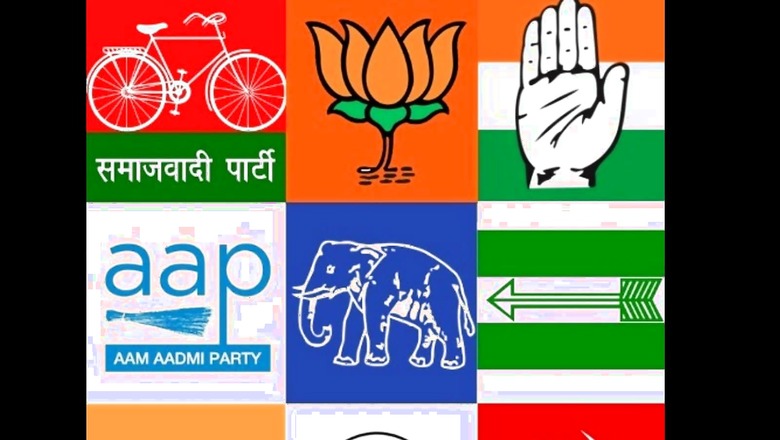
views
According to a Right to Information (RTI) response by SBI, approximately 65 percent of all electoral bonds sold since the scheme’s inception in 2018, until the most recent phase for which data is available (October 1-10, 2022), were sold at the Mumbai, Kolkata, and Hyderabad branches of State Bank of India — but 62 percent of total bonds encashed during this period were at the New Delhi branch, reports state.
The RTI response states that the electoral bonds worth Rs 10,791.47 crore have been sold at 17 SBI branches since the first tranche was sold in March 2018, despite the fact that 29 SBI branches are authorised to sell them.
The Union Finance Ministry recently amended the electoral bond scheme, which began in March 2018, to allow sales for a longer period in a year. According to the November 7 amendment, in addition to the usual four 10-day windows, the government can notify an additional 15 days of sales in any year with Assembly elections. This year’s 23rd tranche of bonds went on sale from November 9 to November 15.
Amid the Himachal Pradesh and Gujarat assembly elections, the issue has found a new focus. News18 explains what electoral bonds are:
An electoral bond is intended to be a bearer instrument, similar to a promissory note, that is payable to the bearer on demand and without interest.
It is the process by which an individual (Indian citizen) or a corporate entity funds a political party.
In 2018, electoral bonds were introduced. The scheme was announced by the Narendra Modi-led NDA government in Gazette Notification No. 20 dated January 2, 2018 in order to “cleanse the system of political funding in the country.”
Electoral bonds, which were introduced to make political party funding more transparent, allow a political donor to purchase bonds from authorised banks and can only be redeemed by parties through registered accounts within a specified time frame.
The primary goal of the electoral bonds scheme was to increase transparency in Indian electoral funding. On February 1, 2017, then-Finance Minister Arun Jaitley stated in his Union Budget speech, “Even 70 years after independence, the country has not been able to evolve a transparent method of funding political parties, which is critical to the system of free and fair elections… Political parties continue to receive the majority of their funding from anonymous cash donations. As a result, an effort must be made to cleanse India’s political funding system.”
It can be purchased by any Indian citizen or a company registered in India. Electoral bonds can be purchased at a designated State Bank of India branch in one of the cities listed by the government.
People and corporations interested in purchasing them must first complete prerequisites such as KYC (Know Your Customer) with the bank for authentication. Bonds in multiples of Rs 1,000, Rs 10,000, Rs 1 lakh, Rs 10 lakh, and Rs 1 crore will be issued.
Electoral bonds have a 15-day grace period during which they can be “donated only to political parties registered under section 29A of the Representation of the Peoples Act, 1951 (43 of 1951) and which secured not less than 1% of the votes polled in the most recent general election to the House of the People or a Legislative Assembly.”
Only through an account with an authorised bank can an eligible political party cash in electoral bonds.
The electoral bonds will be available for purchase at designated SBI branches in the first ten days of each new quarter, which will be in April, July, October, and January.
The main criticism levelled at the electoral bonds scheme is that it accomplishes the exact opposite of what it was intended to do, increase transparency in election funding, a report by Indian Express reveals.
Critics, for example, argue that the anonymity of electoral bonds applies only to the general public and opposition parties. The fact that such bonds are sold through a government-owned bank (SBI) allows the government to learn who is funding its opponents. It’s alleged that as a result, the government of the day could either extort money, particularly from large corporations, or victimise them for not funding the ruling party, giving the party in power an unfair advantage.
Critics such as Anjali Bhardwaj, co-convenor of the National Campaign for People’s Right to Information, have pointed out that the BJP has received major share of the bonds.
The recent amendment came under public scrutiny just days before assembly elections in Gujarat and Himachal Pradesh. However, according to the BJP national spokesperson, the election commission made this decision based on the request of corporate donors.
“The ruling party wants electoral bonds to be available on demand; whenever you feel the need for one, it should be available.” That is the goal. They may face criticism if they do it all at once. As a result, they’re doing it gradually,” said Jagdeep Chhokar, Founding Member and Trustee of the Association of Democratic Reforms (ADR).
Read all the Latest Explainers here


















Comments
0 comment